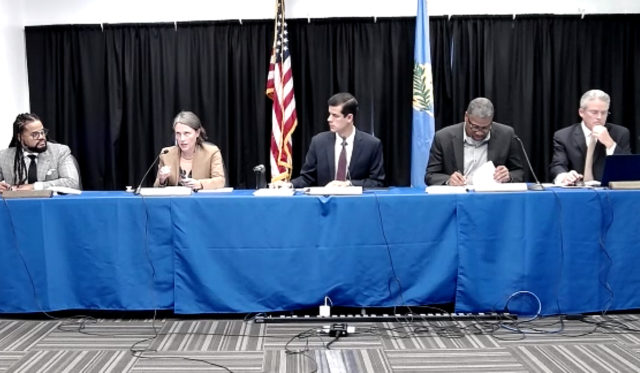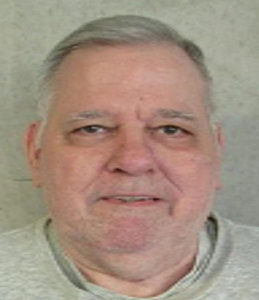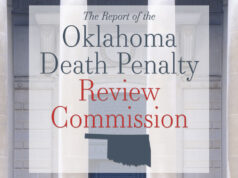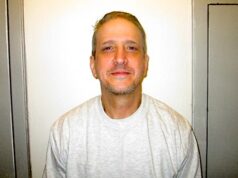

As the state and nation await Gov. Kevin Stitt’s decision on whether to approve the Oklahoma Pardon and Parole Board’s clemency recommendation for death-row inmate Julius Jones, the same board voted 3-2 today to recommend clemency for death-row inmate Bigler Stouffer II. While most of the board members said they believe Stouffer is lying in his claims of innocence, board members expressed concerns about the state’s execution protocols.
Stouffer, who goes by “Bud” and appeared in front of the board Wednesday, was convicted of a 1985 shooting that killed Putnam City school teacher Linda Reaves and wounded her boyfriend and Oklahoma City homebuilder Douglas Scott Ivens.
Stouffer has maintained his innocence, and he told board members that he believes he was lured to the scene of the crime and thought he would become a victim. He said he didn’t know Reaves had been shot in the home. He also said a struggle ensued between himself and Ivens, resulting in Ivens being shot three times.
“I’m totally innocent of the murder of Linda Reaves,” Stouffer said. “My heart goes out to the family of Linda Reaves that had suffered as the result of her murder. I do regret having to injure Doug Ivens, but I had to defend myself or I would be shot myself.
In announcing their votes, Pardon and Parole Board members questioned whether it would be right to send someone to be executed considering how John Grant’s execution unfolded Oct. 28, with media witnesses saying Grant convulsed extensively and vomited during the process. (Oklahoma Department of Corrections director Scott Crow said the statements about convulsions were “embellished.”)
Voting in favor of recommending life without the possibility of parole for Stouffer were board members Adam Luck, Larry Morris and Kelly Doyle. Voting in dissent were Richard Smothermon and Scott Williams.
“We are being asked to participate in a process now, given the last execution, the last four (…) well, that process is obviously flawed where we’ve had individuals on the table suffering for 20 and 30 minutes apiece,” Morris said. “I don’t think that any humane society ought to be executing people that way until we figure out how to do it right.”
Stouffer’s defense attorney claims he was framed
A major debate during Wednesday’s hearing involved the minimal amount of Reaves’ blood that was found on Stouffer’s shirt. Stouffer’s defense attorney said there would have been more blood on his shirt if he had shot Reaves. When it came time for his remarks, Smothermon said he had seen cases where victims had been shot from close range with the same effect in terms of blood splatter.

Speaking for the state were assistant attorney generals Ashley L. Willis and Joshua R. Fanelli, as well as Oklahoma County assistant district attorney Christy Miller.
“Linda Reaves was one of the most innocent persons I’ve had in a murder case,” Miller said. “[Stouffer] has insisted DNA will exonerate him. This is not a DNA case. This is a direct-evidence case.”
Stouffer’s attorney, Mark Barrett, alleged misinterpretations in DNA evidence, inadequate legal counsel and a theory that Stouffer had been framed.
“The position the state has taken in this case is contrary to the physical evidence,” Barrett said. “[Stouffer] should not remain on death row for a crime the physical evidence shows he did not commit. A doubt about his guilt should merit the same response from this as absolute proof of his guilt. Clemency should be granted.”
A former district attorney, Smothermon called the defense “weak.”
“There’s no doubt in my mind that he did commit this crime, and his defenses are weak. They are totally disbelievable,” Smothermon said. “Because of the evidence of overwhelming guilt — and I find not much in the mercy department — my vote is no.”
The board’s recommendation means the final decision will be left to Oklahoma Gov. Kevin Stitt. Stouffer is scheduled to be executed on Thursday, Dec. 9.
Darla Shelden, a spokeswoman with the Oklahoma Coalition to Abolish the Death Penalty, released a statement praising the board’s recommendation.
“The coalition applauds the Pardon and Parole Board for voting 3-2 today to grant clemency to B. J. Stouffer. The board had a thoughtful discussion about the suffering endured by John Grant during his execution on Oct. 28, questioning aloud why any executions are being scheduled before the completion of the trial in Judge Stephen Friot’s court on whether Oklahoma’s lethal injection protocol constitutes cruel and unusual punishment,” Shelden said. “The trial begins Feb 28. The coalition calls on Gov. Stitt to end this madness and stay the six remaining executions until a decision in the federal case is rendered.”
Stitt has yet to announce his decision on Julius Jones, whose execution is scheduled for 4 p.m. Thursday. The Pardon and Parole Board voted 3-1 on Nov. 1 to recommend Jones’ death sentence be reduced to life with the possibility of parole.
Background on the Bigler Stouffer trials
In the murder case, prosecutors alleged that Stouffer went to Ivens’ home, asked to borrow a gun, then shot the couple with Ivens’ .357-caliber magnum pistol.
At trial, Stouffer’s defense only presented one witness, John Call, who is a psychologist. Call said his examination of Stouffer exhibited that he was “immature” and had difficulty making adult decisions.
Call described Stouffer as “a 42-year-old going on 15,” adding “in Mr. Stouffer’s case, more often than not, he uses the judgment of a teenager.”
In an audio recording played during Wednesday’s hearing, Ivens’ estranged wife, Velma Ivens, told police that Stouffer admitted to her that he had shot Reaves and Douglas Ivens.
Stoufer was sentenced to death in 1985 on one count of murder and life in prison for shooting with the intent to kill.
In 1999, an appellate court ruled that Stouffer had inadequate legal counsel at his first trial and granted him a re-trial. In 2003, he was convicted again and received the same sentence.




















